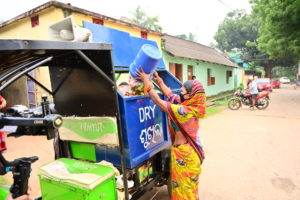Practical Action has launched a new report calling for a people-centred approach to the waste crisis.
With 2 billion people living without waste collection services, there is an urgent need for solutions. The report ‘Managing Our Waste 2021’ calls for a people-centred approach which focuses on the quality of waste services (collection, transport, disposal, reuse, recycling) and opportunities for the most marginalised to be a core part of the solution.

A woman separates waste in Bangladesh
The report draws on research from Bangladesh, Kenya, India and Senegal and shines a spotlight on huge inequality at city level, and the negative consequences of approaches that don’t focus on people.
Rather than focusing solely on waste flows and particular types of waste, the report re-centres the narrative on the systems that work for the people in terms of quality of service, accessibility, affordability and working conditions.
The report highlights the extent to which the poor both suffer disproportionately from inadequate waste management; but can also be a significant driver of solutions that work for all.
Practical Action’s Head of Urban Services, Dr Lucy Stevens explains “All other waste reports have little or no mention of people. Instead, they focus on turtles and coral and miss the one major cause of waste. People. With no focus on people, there is no focus on the one factor that causes the problem, but also offers a solution.
“So, this is an opportunity to take a look at waste from a different point of view, the point of view of those people who are reliant upon it for their livelihoods and also live with the consequences of poor governance and services.
“By looking at waste in a new way, we can also explore the opportunities better management presents for the creation of circular economies and sustainable growth with the needs of people placed at the heart of urban areas.”
Mehrab Ul Goni from Practical Action Bangladesh adds “People living in low-income settlements in our cities are becoming surrounded by waste – both kitchen and plastic waste. The kitchen waste forces people to live in a foul-smelling atmosphere. And plastic, especially thin plastics and polythene is making their lives miserable. The environment they are living in is a risk to their health due to disease from poor waste management. For Bangladesh, inclusive and sustainable waste management is urgently needed.”
The report was launched during the UN-Habitat’s Waste Wise Cities webinar. Practical Action’s CEO, Sarah Roberts and a panel of experts explored findings from four contrasting towns and cities from Africa and South Asia. You can listen again here.
You can download the report here.
For more information about the report, contact Lucy Stevens at [email protected].